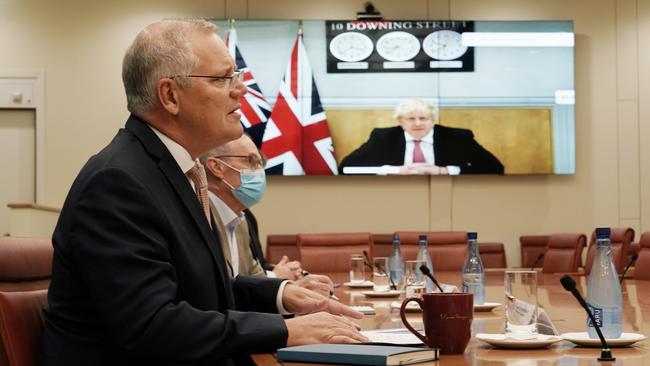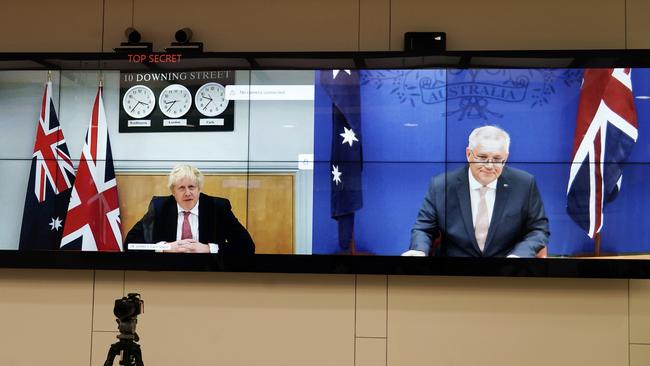Ukraine, China, AUKUS nuclear submarines and climate change top issues in talks between Scott Morrison and Boris Johnson
Scott Morrison and Boris Johnson have agreed on one huge issue that the world is watching, in a call between the two leaders.
National
Don't miss out on the headlines from National. Followed categories will be added to My News.
A Russian invasion of Ukraine would be a “massive strategic mistake” with a “stark humanitarian cost” and must be prevented, Prime Minister Scott Morrison and his UK counterpart Boris Johnson have agreed.
The pair met virtually overnight on Wednesday for high-level talks, discussing the “concerning” situation in Ukraine, “credible reports” of human rights violations in China, the importance of peace and stability in the Indo-Pacific, climate change, progress on the AUKUS nuclear-powered submarines agreement and the Covid-19 pandemic response.

As Russian troops continue to amass along Ukrainian borders, Mr Morrison and Mr Johnson reinforced their “unwavering commitment” to Ukraine’s sovereignty, independence and territorial integrity.
“The Prime Ministers … agreed the need for de-escalation and underscored that any further Russian incursion in Ukraine would be a massive strategic mistake and have a stark humanitarian cost,” a joint statement released after the meeting said.

Mr Johnson and Mr Morrison reinforced their agreement to ensure a “free, open, inclusive and prosperous” Indo-Pacific, and work together to strengthen the region’s resilience to “state threats,” cyber and maritime security.
They expressed “grave concerns” about credible reports of human rights violations in Xinjiang and called on China to “protect the rights, freedoms and high degree of autonomy for Hong Kong enshrined in the Sino-British Joint Declaration and the Basic Law”.
“Leaders further underscored the importance of peace and stability across the Taiwan Strait, and expressed support for Taiwan’s meaningful participation in international organisations, as a member where statehood is not a prerequisite and as an observer or guest where it is,” the joint statement said.
“Leaders recognised the importance of countries being able to exercise their maritime rights and freedoms in the South China Sea consistent with the UN Convention on the Law of the Sea.”
Mr Morrison and Mr Johnson were agreed in their “strong opposition” to any “unilateral actions” that would “escalate tensions and undermine regional stability and the international rules-based order, including militarisation, coercion, and intimidation”.
They also welcomed the opportunities the finalisation of the Free Trade Agreement between Australia and the UK, announced plans for a joint supply chain resilience capability building initiative and reaffirmed their commitment to “ambitious” climate change action to keep global warming of only 1.5 degrees “within reach”.

The historic AUKUS agreement, including the UK’s agreement to share its nuclear-powered submarine knowledge with Australia, was described as a “cornerstone” of the nations’ shared efforts to promote an open, inclusive and resilient Indo-Pacific.
“Since AUKUS was announced in September 2021, all three partners have made significant progress in their collective endeavour to provide the Royal Australian Navy with a conventional-armed nuclear-powered submarine capability at the earliest possible date,” the joint statement said.
“Significant progress is also being made by AUKUS partners on Advanced Capability collaboration, with officials from the three countries meeting this week in London to discuss cyber capabilities, artificial intelligence, quantum technologies and additional undersea capabilities.


“The Prime Ministers expressed their determination to continue to work closely together, in lock-step with President Biden, to make AUKUS a success, and looked forward to the next set of trilateral discussions at the end of the month in Australia.”
The Leaders committed to “deepening co-operation on online safety and security”, including tackling child sexual exploitation and abuse and preventing terrorist use of the internet.
The Prime Ministers also set out their determination to “overcome the current pandemic” and “be better prepared for the future”.
“They recommitted to helping build a more responsive and resilient global health system, with a sustainably funded World Health Organisation (WHO) at its core,” the statement said.
“They committed to work to ensure the new international instrument on pandemic prevention, preparedness, and response that empowers a stronger, more independent WHO. They reaffirmed support for efforts to identify the origins of the Covid-19 pandemic.”





